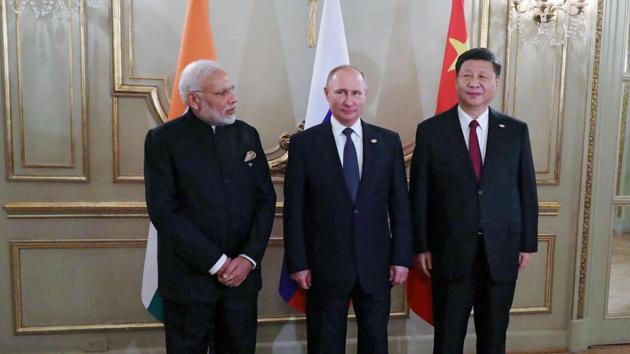On global stage, PM Narendra Modi cements key relations, seeks support on economic fugitives
The opening day of the summit on Friday was a day of hectic engagements for Narendra Modi who, hours earlier, took part in another powerful trilateral meeting with US President Donald Trump and Japanese Prime Minister Shinzo Abe.
Prime Minister Narendra Modi, Chinese President Xi Jinping and Russian President Vladimir Putin discussed the need for reforming and strengthening multilateral institutions, seeking to take the lead in global economic governance, when they met on the sidelines of the Group of 20 (G20) summit in the Argentine capital.

The opening day of the summit on Friday was a day of hectic engagements for Modi who, hours earlier, took part in another powerful trilateral meeting with US President Donald Trump and Japanese Prime Minister Shinzo Abe.
At the summit, India also released a nine-point agenda, including a call for stronger cooperation between countries in efforts to catch fugitive economic offenders. The call comes against the backdrop of Indian efforts to secure the return of jewellers Nirav Modi and Mehul Choksi, and businessman Vijay Mallya. All of them fled India for overseas before the law caught up with them over unpaid bank loans to the tune of thousands of crore.
The Russia-India-China (RIC) meeting took place after a gap of 12 years, according to Raveesh Kumar, the spokesperson for the external affairs ministry, who said the interaction between the three leaders was “characterised by warmth and positivity”.
“Leaders discussed cooperation and coordination in various areas which could contribute to global peace and stability,” he wrote in a Twitter post.
Modi on Saturday met South African President Cyril Ramaphosa on the sidelines of the summit and invited him to be the chief guest at the Republic Day celebrations next year. The South African leader accepted the invitation.
“Glad to have met President @CyrilRamaphosa. At a time when India is marking the 150th birth anniversary of Mahatma Gandhi, it is our honour to welcome President Ramaphosa as the Chief Guest for the 2019 Republic Day celebrations. Bapu’s close link with South Africa is well known,” Modi tweeted after the meeting.
Briefing the media about the RIC meeting, foreign secretary Vijay Gokhale said the trilateral was a “very positive meeting”.
“Prime Minister thanked President Putin for initiating this effort and all three leaders felt that given our respective roles as emerging economies and emerging markets, given our respective roles and influence in the world in terms of maintaining peace and stability in the region that it was perhaps important that the three countries should cooperate and coordinate in various areas in order to contribute to global peace and prosperity,” Gokhale said.
The views expressed by all three leaders were very similar and “they all felt that we should work together to steer global economic governance,” he added.
“They felt that the three countries should work together where we could promote peace and stability in regional crisis.”
In a message on his personal Twitter handle, Modi said he, Putin and Xi discussed “a wide range of subjects that would further cement the friendship between our nations and enhance world peace.”
In what foreign affairs analysts described as a diplomatic balancing act, the meeting came only a couple of hours after Modi met Trump and Shinzo Abe, and held talks on extending cooperation in connectivity and maritime issues in the Indo-Pacific.
“The RIC is about multipolarity and multilateralism. It is about North Korea, Syria, climate and to block any Western intervention in the affairs of other countries. This is about the continental domain,” said Srikanth Kondapalli, a professor at Jawaharlal Nehru University and foreign affairs special. “JAI (Japan, America, India) is about the Indo-Pacific and in the maritime domain. JAI provide some security following China’s assertiveness in the South China Sea and the inability of any country to stand up to such action .”
Modi, Trump and Abe met for around 15 minutes. “Japan, the US and India share fundamental values and strategic interests,” Abe said. The three also discussed the situation in Afghanistan and Ukraine, according to a senior Indian official who didn’t want to be named.
A trade war between US and China, and a Russia’s naval skirmish with Ukraine have loomed over the gathering of the world’s top 20 economic powers. President Trump called off a scheduled meeting with his Russian counterpart in the days leading up to the summit.
With markets watching nervously, Trump has described the G20 meeting as a deadline for China to meet his demands over trade or risk coming under greater pressure.
India presented a nine-point agenda to G20 member-nations calling, among other measures, for strong and active cooperation among them to comprehensively deal with fugitive economic offenders.
Presented by Prime Minister Narendra Modi in the second session of the Summit on international trade, international financial and tax systems, the agenda said “cooperation in legal processes such as effective freezing of the proceeds of crime, early return of the offenders and efficient repatriation of the proceeds of crime should be enhanced and streamlined”.
India also called for joint efforts by G-20 countries to put together a mechanism that denies entry and safe havens to economic offenders who seek to run away from their home countries to avoid prosecution and punishment.






